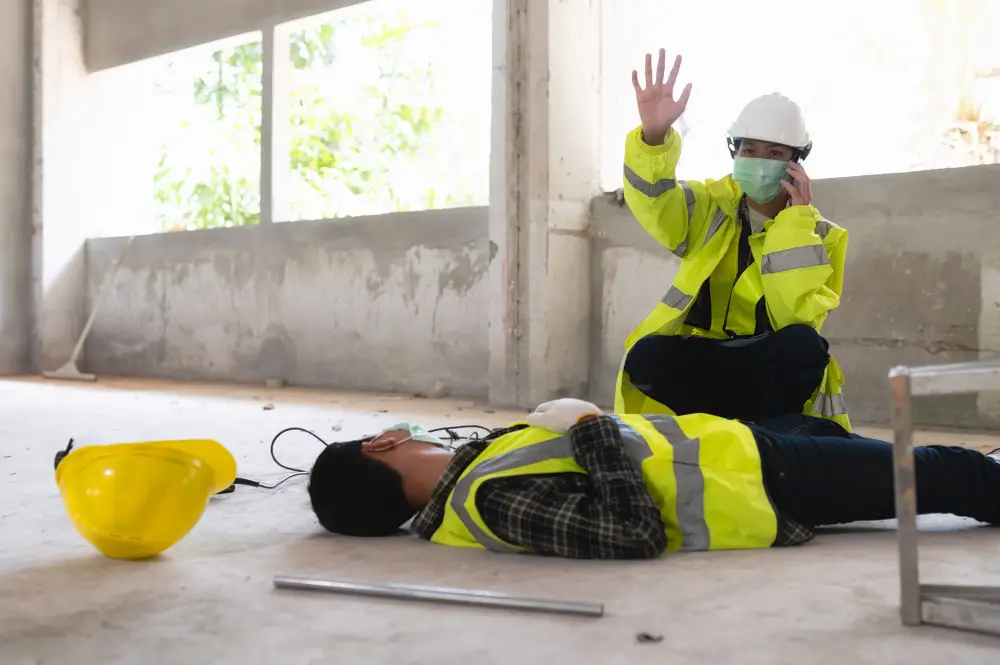Working on a construction site can be a perilous occupation, with numerous potential hazards lurking at every turn. From falling debris to heavy machinery accidents, the risks are manifold.
If you’ve suffered an injury on a construction site, you might be feeling confused and stressed about your legal rights. This guide will walk you through the essential steps you need to take to safeguard your interests and navigate this complex situation.
Seek Immediate Medical Attention

The paramount concern following any construction site injury should be your health. Seek immediate medical attention, even if your injuries seem minor at first. Health complications can manifest later, and a prompt medical examination provides a record of the injury, essential for any future legal claims.
Some injuries are not apparent right away and could lead to serious health complications if left untreated. Therefore, seeing a doctor is not just about making sure you’re okay; it’s also about documenting your injuries in case you need to take legal action later.
The medical professional attending to you will document your injuries, and this documentation is a crucial piece of evidence in your case. It’s important to follow all the doctor’s instructions and keep all appointments. This shows that you’ve been consistent in your care and can aid your case.
Report the Accident
Following a construction site accident, it’s crucial to report the incident to your employer as soon as possible. This creates an official record of the event, which is key when pursuing a workers’ compensation claim or personal injury lawsuit.
If you’re able, try to document the accident yourself. Take photographs of your injuries and the site where the accident occurred. Collect the names and contact information of any witnesses. All of this information can be valuable evidence if you decide to take legal action.
Don’t delay in reporting the accident, even if you feel your injuries are minimal. Some injuries take time to become apparent, and delays in reporting could complicate your case. It’s always better to err on the side of caution. Also, remember to keep a copy of the accident report for your records.
Hire a Construction Accident Attorney

If you’ve suffered serious injuries, it might be beneficial to hire a construction accident attorney. These professionals understand the intricacies of construction accident law and can guide you through the often complex process of filing a claim.
Your attorney can help you understand your rights and options, collect and analyze evidence, handle negotiations with insurance companies, and if necessary, represent you in court. A skilled attorney could be the difference between a successful claim and one that falls short.
While it’s possible to handle a claim on your own, a lawyer can help ensure that you take all the necessary steps and meet all deadlines. This can be particularly beneficial if you’re recovering from severe injuries.
With a personal injury lawyer by your side, you can focus on recovering while they handle the legal aspects of your case. Also, most construction accident attorneys work on a contingency basis, meaning you only pay if they win your case.
Understand Workers’ Compensation
Workers’ compensation is a form of insurance that provides compensation to employees who are injured on the job. It’s important to understand your rights and obligations under workers’ compensation law.
In many cases, injured workers are entitled to benefits for medical expenses, lost wages, and disability. However, by accepting workers’ compensation, you typically agree not to sue your employer for the accident.
Understanding the nuances of workers’ compensation can be complicated, but a knowledgeable attorney can help. They can guide you through the process, ensuring you make informed decisions about your case.
In some instances, a workers’ compensation claim might not be enough to cover all your losses. A lawyer can help you explore other legal options, such as filing a personal injury lawsuit against third parties responsible for your injuries.
File a Personal Injury Lawsuit
In some cases, you may be able to file a personal injury lawsuit in addition to, or instead of, a workers’ compensation claim. You might pursue a lawsuit if a third party’s negligence caused your injury, or if your employer intentionally caused your harm.
Filing a lawsuit can potentially lead to greater compensation than a workers’ compensation claim alone. However, lawsuits can take longer and require more evidence. It’s important to consult with an attorney to determine the best course of action for your specific situation.
Personal injury lawsuits can be complex, and they require a comprehensive understanding of the law. Hiring an experienced construction accident attorney can increase your chances of a successful lawsuit. They can help you gather evidence, determine liability, and negotiate a settlement or represent you in court if necessary.
Protect Your Future Interests
Lastly, it’s essential to consider the long-term impacts of your injury. You may need ongoing medical care or be unable to return to the same line of work. In these cases, you’ll need to make sure your settlement or lawsuit takes these future needs into account.
Remember that once you accept a settlement, it’s typically final. You won’t be able to go back and ask for more money if you discover later that your injuries are more severe than you initially thought.
Consult with an attorney and consider seeking advice from a financial planner. They can help you understand the long-term financial implications of your injury and ensure that your settlement will cover your future needs. Not only will this protect your interests, but it will also provide peace of mind as you navigate the legal process and focus on your recovery.
Navigating the aftermath of a construction site injury can be challenging and confusing. However, by following these steps, you can protect your rights and ensure the best possible outcome. Remember to prioritize your health, report the incident promptly, understand your rights under workers’ compensation, and consider seeking legal counsel.
Your attorney can provide invaluable guidance, helping you navigate complex legal proceedings and fight for the compensation you deserve. Above all, always consider your long-term needs and interests. With the right approach, you can overcome this difficult time and secure a stable future.
Recap




